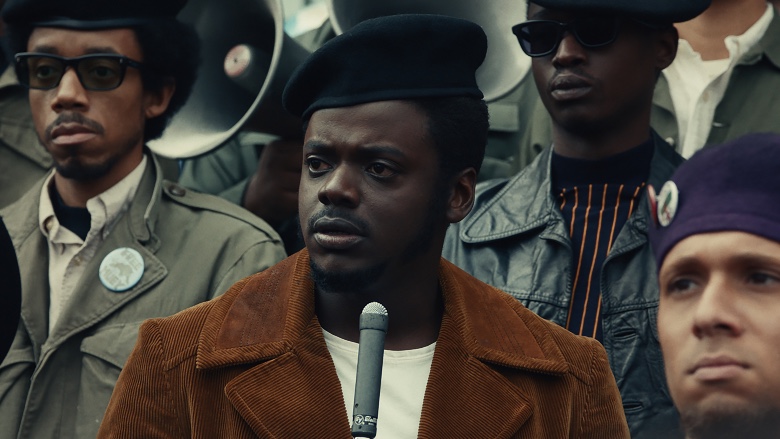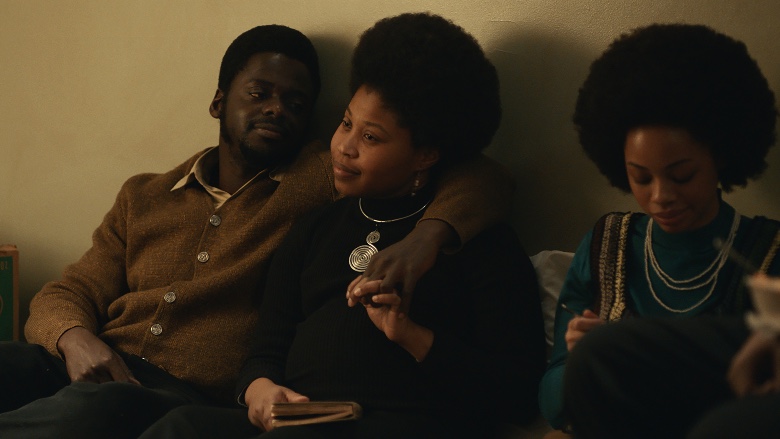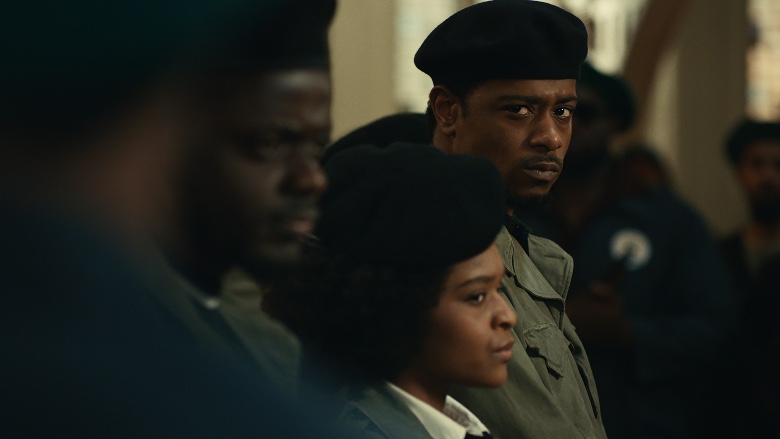
If we’ve learned anything from the past year in movies, it’s that the late ‘60s were not a great time for the African-American community. Despite the Civil Rights Act passing and brief spates of progress towards equality, the government continued to repress black men and women, particularly in the guise of FBI director J. Edgar Hoover. This is probably why the Black Panther Party rose to prominence and why recent movies like The Trial of the Chicago 7 and those that make up Steve McQueen’s Small Axe Anthology have been recounting stories about Black Panther leaders with regularity.
In 1968 Chicago, 20-year-old Fred Hampton (Daniel Kaluuya from Get Out) was rising to power as the head of the Illinois Black Panther Party, immediately garnering the attention of the FBI, who realized they needed to do something about Hampton’s power over his community. This comes in the form of Agent Roy Mitchell (Jesse Plemons), who coerces career criminal William O’Neill (LaKeith Stanfield) to infiltrate the Black Panthers for the FBI and get intel on their movements, particularly in relation to Hampton. Around the same time, they would go after Hampton’s friend and colleague Bobbie Seale as depicted in Trial. (If you’ve already seen that movie, you may already know Hampton’s fate, but not know what happened to him.)
Directed by Shaka King (2013’s Newlyweeds) from a screenplay co-written with Will Berson (and based on a story originating from the comedic Lucas Brothers), Judas and the Black Messiah is an amazing story on par with the one that led to Spike Lee’s BlackKklansman. It took the real William O’Neil speaking on the record for the PBS documentary Eyes on the Prize 2, admitting to his part in Hampton’s demise, that led to this story coming to light.
Because of this and more than anything else, Judas will be remembered for Kaluuya’s indelible performance as Hampton, his rousing and riveting speeches counterbalanced with his lovely romance with the quiet and shy Deborah Johnson (Dominique Fishback), his home life helping to show a far more grounded side to Hampton than his public persona.

As a long-time fan of LaKeith Stanfield’s work, he didn’t seem to be bringing more of his A-game to play O’Neil, although admittedly, it would have been nearly impossible to counter the smoldering energy Kaluuya brings to “Chairman Fred.” You can tell that O’Neil is torn up by the way he’s being used for the FBI’s means and how that situation ends.
Fishback isn’t the only great female role, as there’s also Dominique Thorn as Hampton’s militant gun moll Judy Harmon, who is rightfully dubious of O’Neill’s interest in the party. There’s also a show-stopping dramatic scene between Kaluuya and Alysia Joy Powell as his mother Ms. Winters. Other key roles include a brief scene of Martin Sheen as FBI head J. Edgar Hoover as the film begins and then again a bit later, though it’s a relatively small role within a fine overall cast that also includes Ashton Sanders (Moonlight) and a third Get Out veteran in Lil Rel Howery.
As much as King’s film is about the words and the performances, none of the above would maintain any form of authenticity if King didn’t have such a great team making the cast look great, whether it’s the period costumes by Charlese Antoinette Jones – and in this case, it might just be proper period T-shirts, or leather jackets and berets — or the vast makeup team under Makeup Head Sian Richards (Black Panther) and the hair department under Rebecca Woodfork. They give each member of Hampton’s group their own distinct look and personality, as well as making Stanfield look different from when he’s dealing with the feds and when he’s undercover. If Jason Collins’ prosthetic make-up was ever used to make Kaluuya look more like the real-life Hampton, it’s fairly transparent and imperceivable, but it’s still impressive work overall if not particularly flashy.
In fact, much of Judas and the Black Messiah relies on King’s team to recreate the environment and times in which Hampton was rising to power. Production Designer Sam Lisenco (If Beale Street Could Talk) finds a way to recreate Chicago of the ‘60s within Pittsburgh working with Art Director Jeremy Woolsey and Set Decoration by Rebecca Brown that goes for a stark simplicity that is just enough to set a scene without distracting from it.
All the above is captured by the able camera and lighting of Cinematographer Sean Bobbitt (12 Years a Slave), who creates just enough of a retro look to the film that it never distracts from the words being said either by Hampton or those speaking against him. At times, Bobbitt’s camera goes right into a close-up on Hampton’s face, and there are just as many intimate moments as there are large scale rallies.

That brings us to the score by Mark Isham and Craig Harris, which at times is jarring with its atonal mix of strings and winds blending together, combined with terrific choices of period music. The terrific mix by Oscar winner Skip Lievsay (Gravity) keeps that music at the right level to keep the viewer on edge, bolster the words being said but never lets it overpower them, and both elements are in play in the scenes where Hampton is preaching to his amassed followers.
What might surprise some viewers is how frequently Judas accelerates its pace to that of an action film compared to something like Trial. This is where the editing by Kristan Sprague comes into play to keep the storytelling moving at a brisk pace, and that’s particularly the case when the police lay siege to the Black Panther headquarters in a shootout where everything comes to a head before we’re returned to the humanity of what it must have been like living in Chicago during those times.
All these elements combine together to tell another tragic story of a black man brought down in his prime for speaking truth in the ‘60s, but equally important is the way this film announces the arrival of Shaka King as a director capable of some potent filmmaking. There’s little question that Judas and the Black Messiah is an impressive second feature for King, a biopic paced like a Scorsese film, one that’s likely to get a lot of attention for Kaluuya’s portrayal of Hampton but should also get just as much attention for how well the film tells Hampton’s story.
Judas and the Black Messiah will hit theaters and stream on HBO Max starting Friday, February 12.
Look for our interviews with Cinematographer Sean Bobbitt and Editor Kristan Sprague shortly.
All photos courtesy Warner Bros. Pictures.





